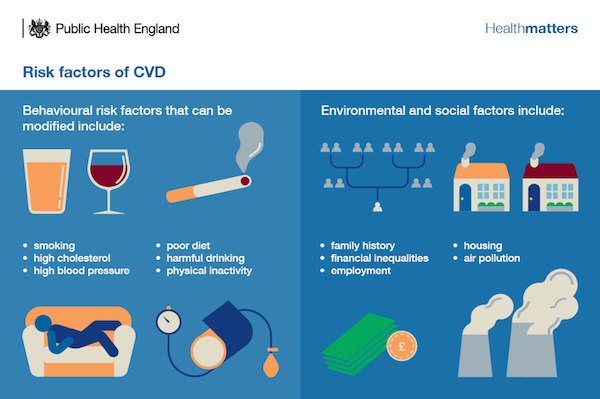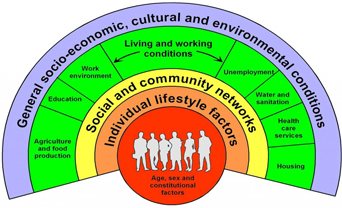
If you haven't joined in a tweet chat before it's very simple. Here's a guide Tweet
Chat Details
fHosted by WeNurses using #AllOurHealth
Cardiovascular disease prevention - Tweetchat 4 University of Nottingham
In England nearly 7 million people are living with cardiovascular disease (CVD), it contributes to over a quarter of deaths each year and health and social care costs in England relating to CVD are estimated at £7.4 billion each year. (PHE 2020)
CVD remains an important issue as it’s a contributor to mortality, morbidity and health inequalities and stalling of reductions in CVD mortality. This is costly to the individual, the NHS and wider system.
The infographic below identifies some of the risk factors for CVD:
(PHE 2020)
To achieve a change in individual risk factors and an individual’s overall risk of CVD we need action which will enable behaviour change at population, community and an individual level.
The behaviour change wheel (below) published by the University College London helps us to understand the types of policies and interventions that have an influence on behaviour.
(Michie 2012 )
This tweetchat aims to explore CVD, behaviour change and personalised care and what we, as health care professionals can do in our day to day roles to prevent CVD. The questions we will be asking in the Tweetchat are:
- What sort of behaviour change do people need to make to reduce the risk of CVD?
- How can personalisation help us as healthcare professionals to address cardiovascular disease in our day to day roles?
- What practical action can you put into practice immediately to reduce the risk of CVD for the people you care for?
Chat Contributers
 100 Tweets
100 Tweets
200 Tweets
20000 Impressions
20000 Impressions
20000 Impressions
Engagement Wheel
Chat Word Cloud
Participant bio cloud
Chat Summary
Post Chat Comments
You'll need to be logged into via Twitter from the main menu, then you can share your post chat comments...
|
@{{Comment.screenName}}
{{Comment.DateCreated | date:"dd MMMM yyyy HH:mm"}}
|
{{Comment.Comment}} |
#AllOurHealth transcript
|
@WeLearnOutLoud
11 August 2020 15:03
|
Hello and welcome to the University of Nottinghams #AllOurHealth Tweetchat on Cardiovascular Disease ( CVD) Lets get started with QUESTION 1 What sort of behaviour change do people need to make to reduce the risk of CVD? https://t.co/zr6iWOZnxG | |
|
@alicialwatts
11 August 2020 15:04
|
@WeLearnOutLoud There are many different behaviours which cause CVD risk. These include smoking, excessive alcohol consumption, poor diet, and lack of physical exercise. By modifying these risk factors, it can reduce an individual’s chance of developing CVD and supports health #AllOurHealth. | |
|
@BridgetEleri
11 August 2020 15:04
|
@WeLearnOutLoud Behaviour changes to reduce risk of CVD includes being smokefree, reducing cholesterol and salt intake through dietary changes and adopting an exercise regime. The NHS has free resources that can help with these changes #AllOurHealth | |
|
@WinfieldLorna
11 August 2020 15:05
|
#AllOurHealth People need to look at choices they make regarding their diet, activity levels, alcohol consumption and smoking in order to reduce their risk of developing CVD. | |
|
@WeLearnOutLoud
11 August 2020 15:07
|
Yes absolutely #AllOurHealth https://twitter.com/alicialwatts/status/1293186545734672390 | |
|
@WeLearnOutLoud
11 August 2020 15:08
|
They do indeed ... and its worth being aware of the resources out there so that we can pass them on to the people we care for when needed #AllOurHealth https://twitter.com/BridgetEleri/status/1293186646746075137 | |
|
@SNmeg7
11 August 2020 15:09
|
@WeLearnOutLoud #AllOurHealth People need to change their exercise and lifestyle habits, such as salt intake, and HIIT workouts which can help to strengthen the heart muscle! | |
|
@WeLearnOutLoud
11 August 2020 15:09
|
Yes absolutely ... can be quite tough to do though and seem like quite a climb ... how can we help people to make the changes needed ? #AllourHealth https://twitter.com/WinfieldLorna/status/1293186807912206339 | |
|
@WinfieldLorna
11 August 2020 15:12
|
@WeLearnOutLoud We need to make sure we help people to understand the changes needed and why. we then need to support them to do it. information about how to make the first steps with stopping smoking and that they are morel likely to succeed with support etc. #AllOurHealth | |
|
@Mercy13648661
11 August 2020 15:15
|
#AllOurHealth Behavioural Changes include: incorporating exercise and healthy enjoyable dishes, as part of everyday life. For example, in my personal life, I've made it a habit to walk at least 40mins a day. This is realistic for me &I've maintained this habit for 5 months now. | |
|
@PAvajah
11 August 2020 15:16
|
@WeLearnOutLoud they could take care of their diet and make sure their bodies are getting all the nutrients that are needed to promote good health they could stop/reduce smoking drinking they could also become more physically active #AllOurHealth | |
|
@WeLearnOutLoud
11 August 2020 15:16
|
Wow well done Mercy that's brilliant - yes the changes have to be person centred #AllOurHealth https://twitter.com/Mercy13648661/status/1293189223479013377 | |
|
@AgencyNurse
11 August 2020 15:17
|
@Mercy13648661 thats brilliant Mercy - have you checked out the #NursesActive hashtag ? Lots of nurses getting active through August and encouraging each other :D #AllOurHealth | |
|
@WeLearnOutLoud
11 August 2020 15:19
|
QUESTION 2 How can personalisation help us as healthcare professionals to address cardiovascular disease in our day to day roles? #AllOurHealth | |
|
@BridgetEleri
11 August 2020 15:19
|
@WeLearnOutLoud Taking a holistic approach to care is something very much in the forefront of contemporary care. CVD risk factors are extensive and different to each individual so it is vital that we see each patient as a whole person to best guide them and minimise risk of CVD #AllOurHealth | |
|
@WeLearnOutLoud
11 August 2020 15:20
|
A really nice answer Bridget #AllOurHealth https://twitter.com/BridgetEleri/status/1293190338790608898 | |
|
@WinfieldLorna
11 August 2020 15:21
|
#AllOurHealth personalisation lets us see the individuals specific needs and tailor their care to meet these needs. for example some people find one way of quitting smoking works for them and others find other ways more helpful. | |
|
@SNmeg7
11 August 2020 15:21
|
@WeLearnOutLoud #AllOurHealth CVD symptoms or cases will be different for each patient, and so it is important to personalise care, to ensure individuals needs are met. | |
|
@WeLearnOutLoud
11 August 2020 15:21
|
RT @SNmeg7: @WeLearnOutLoud #AllOurHealth CVD symptoms or cases will be different for each patient, and so it is important to personalise c… | |
|
@AgencyNurse
11 August 2020 15:22
|
@SNmeg7 @WeLearnOutLoud really fab answer but how do we ensure that we do this for each person ?? What practical steps should we take ? #AllOurHealth | |
|
@alicialwatts
11 August 2020 15:23
|
@WeLearnOutLoud #AllOurHealth | |
|
@WeLearnOutLoud
11 August 2020 15:23
|
#AllOurHealth https://twitter.com/ElliPhi64824504/status/1293191179484278784 | |
|
@WeLearnOutLoud
11 August 2020 15:24
|
#AllOurHealth https://twitter.com/alicialwatts/status/1293190908259627011 | |
|
@Jonatha16988918
11 August 2020 15:27
|
@WeLearnOutLoud By caring for people as individuals, we can tailor specific plans to people, getting a better understanding of peoples habbits and choices, will improve the care we provide #AllOurHealth | |
|
@suenewse99
11 August 2020 15:28
|
@WeLearnOutLoud #AllOurHealth I have started couch to 5k and yoga.I have AF so it is a very personal issue for me.Having watched my dad have an AF related Stroke,consequently die from Vascular Dementia,I feel I need to take responsibility for trying to maintain healthy,not always easy to do tho' | |
|
@SNmeg7
11 August 2020 15:28
|
@AgencyNurse @WeLearnOutLoud When caring for a patient with CVD you assess their presented symptoms and talk with them about how these can be alleviated for the patient. Involving the patient in their care but also consulting from other healthcare professionals is a good way to treat patients. #AllOurHealth |





